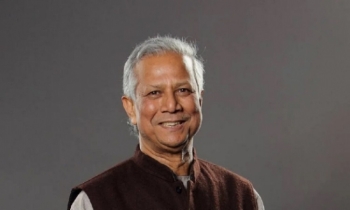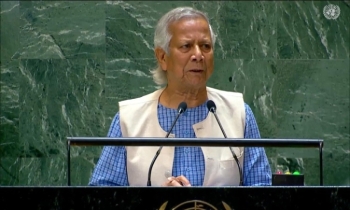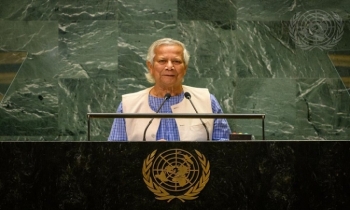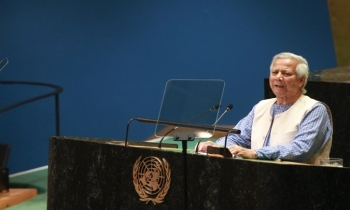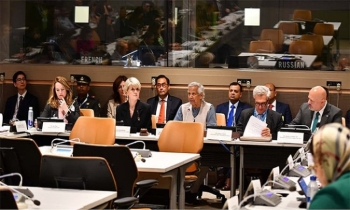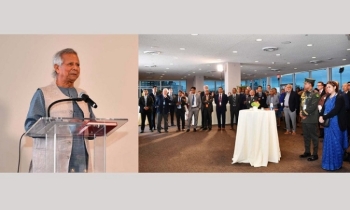BBC report lauds Bangladesh’s disaster management measures
BI Report || BusinessInsider

A volunteer of Bangladesh’s Cyclone Preparedness Programme takes part in an early warning drill. Photo: Collected from BBC
Being a disaster-prone country, Bangladesh annually faces several natural disasters and extreme weather conditions, often with devastating impacts.
Floods, flash floods, erosion, and cyclonic storms - all appear with an amplified version and create a record of havoc each time. The negative impacts of climate change are blamed for the incidents in the report.
However, in recent times, the death tolls and the severity of damages have reduced dramatically for the multi-layered warning system that Bangladesh has adopted over the years.
Bangladesh has developed a comprehensive early disaster warning system combining communication systems, weather monitoring and an enriched network of volunteers, mostly females.
Despite relatively fewer resources, the system is up to the mark, working smoothly and saving lives and properties during disasters. Now, Bangladesh has become an icon for the other low-income countries that are also victims of climate change and looking to develop their disaster management systems.
A BBC report on Wednesday titled “The country trailblazing the fight against disasters” lauded the initiatives of Bangladesh’s measures in disaster management.
According to the report, Bangladesh has really been a bit of a pioneer when it comes to seeing what an effective early warning system can look like.
“Bangladesh has really been a bit of a trailblazer when it comes to seeing what an effective early warning system can look like,” said John Harding, head of the World Meteorological Organisation (WMO)'s climate risk and early warning systems (CREWS) secretariat.
"[Early warning systems] are one of the most effective tools that we have at our disposal to deal with these climate change impacts," Harding added.
The start of Bangladesh's world-leading system dates back to 1970 when Cyclone Bhola resulted in the death of an estimated half a million people in the Bay of Bengal – one of the deadliest storms ever recorded.
The disaster prompted Bangladesh to begin investing heavily in weather forecasting technology, cyclone shelters and training up a network of volunteers along the coast.
When Cyclone Amphan made landfall in 2020 as a strong Category 2 cyclonic storm – almost as severe as Bhola's Category 3 – it recorded a death toll of just 26.
Bangladesh's success in lowering its death toll is due, in part, to this improved ability to monitor and track cyclones as they form over the Bay of Bengal.
In 1970, the country had only two coastal radars, with the ability to track the progress of cyclones once they were within 200 miles (322km) of the coast. But now, a comprehensive network of weather stations, including coastal radars, ground-based stations and balloon-borne instruments measuring air pressure and humidity enable Bangladesh to closely monitor developments in real-time.
Bangladesh's early warning systems use a variety of communication methods, including TV and radio broadcasts, push messages via mobile phone networks, targeted SMS notifications, and a helpline which people can dial to listen to pre-recorded voice messages.
But the key to reaching as many people as possible – known as "the last mile" by disaster risk reduction experts – lies in the country's huge network of volunteers.
In the wake of the 1970 disaster, the Bangladesh Red Crescent Society set up a cyclone preparedness programme (CPP), with the aim of reducing unnecessary deaths and improving community resilience. Now overseen by the government's ministry of disaster management and relief (MoDMR), the programme has over 76,000 volunteers in villages along the coast.
Several studies have found that during disasters, a community-led response – with government and non-profit support – is essential for the rapid, widespread action which saves lives.
The ability to quickly spread information at a local level has been particularly important in saving the lives of women, who across the globe are often disproportionately affected by sudden-onset disasters.
In 1970, Bangladesh had just 44 cyclone shelters. But in the wake of the Bhola disaster and with the combined efforts of the government and international aid, this had increased to almost 4,000 formal shelters by the mid-2000s. Most double up as schools and community centres.
Bangladesh government’s recent Mujib Climate Prosperity Plan aims to both increase the resilience of coastal populations and use the global need to tackle and adapt to climate change as a catalyst for greater economic prosperity, creating a projected 4.1m jobs by investing in clean energy and fossil-free infrastructure projects, among other schemes.


